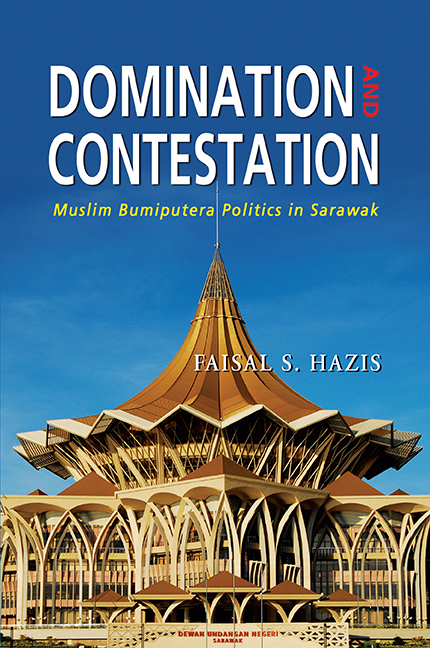Book contents
- Frontmatter
- Contents
- List of Tables
- List of Figures
- Preface
- List of Abbreviations
- 1 Introduction
- 2 State and Social Forces in Sarawak
- 3 The Resurgence of Muslim Bumiputera Politics, 1970–81
- 4 Years of Turbulence, 1981–87
- 5 Consolidation and Domination of the Muslim Bumiputera, 1987–2003
- 6 Muslim Bumiputera Politics in the Post-Mahathir Era, 2003–06
- 7 The Coastal Malays of Southwest Sarawak: A Case Study of the Muslim Bumiputera's Political Domination
- 8 Conclusion
- Postscript
- Appendices
- Bibliography
- Index
- About the Author
- Frontmatter
- Contents
- List of Tables
- List of Figures
- Preface
- List of Abbreviations
- 1 Introduction
- 2 State and Social Forces in Sarawak
- 3 The Resurgence of Muslim Bumiputera Politics, 1970–81
- 4 Years of Turbulence, 1981–87
- 5 Consolidation and Domination of the Muslim Bumiputera, 1987–2003
- 6 Muslim Bumiputera Politics in the Post-Mahathir Era, 2003–06
- 7 The Coastal Malays of Southwest Sarawak: A Case Study of the Muslim Bumiputera's Political Domination
- 8 Conclusion
- Postscript
- Appendices
- Bibliography
- Index
- About the Author
Summary
This book is a revised and updated version of my PhD thesis submitted to Universiti Sains Malaysia in 2008. It analyses the political domination of the Muslim bumiputera in Sarawak, focusing on the period between 1970 and 2006. The book also draws attention to the most recent development in Sarawak politics particularly the historic 2008 elections which are highlighted in the Postscript.
The idea behind this study was sparked by the need to fill the knowledge vacuum on Muslim bumiputera politics that had been left unattended for so long. Since most of the literature on Muslim bumiputera politics covered the colonial and post-Independence period, this study analyses political change among the community beyond the corresponding period. At the same time, this study aims to contribute to the ongoing debate on state power in Malaysia especially its capabilities to dominate society. While much of the existing literature tends to focus on the overwhelming power of the state, this study argues that the state has to occasionally accommodate various social forces which subsequently lead to changes in society and the state itself. This strategy would safeguard the state's position in society but paradoxically weaken its authority.
Since the literature on Muslim bumiputera politics in Sarawak is relatively sparse, this study had to rely heavily on documentary evidence such as government gazettes, local newspapers and government documents as a major source of information. In analysing the Muslim bumiputera's voting trend, this study utilized the electoral data published by the Election Commission of Malaysia. This was complemented by referring to secondary sources, books and journals, on Sarawak politics and on Muslim bumiputera politics specifically.
In the course of completing this book, several individuals and institutions had guided, supported and inspired me. My greatest gratitude goes to my supervisor, Professor Dr Francis Loh Kok Wah, for setting ambitious goals and constantly pushing me to achieve them. I am also grateful to Professor Dr Johan Saravanamuttu for his kind advice during the early stage of my study. In Sarawak, I must thank my colleagues at the Faculty of Social Sciences, Universiti Malaysia Sarawak for their support and encouragement. The staff at the Sarawak Museum Library were helpful with archival documents.
- Type
- Chapter
- Information
- Domination and ContestationMuslim Bumiputera Politics in Sarawak, pp. xi - xiiPublisher: ISEAS–Yusof Ishak InstitutePrint publication year: 2011

